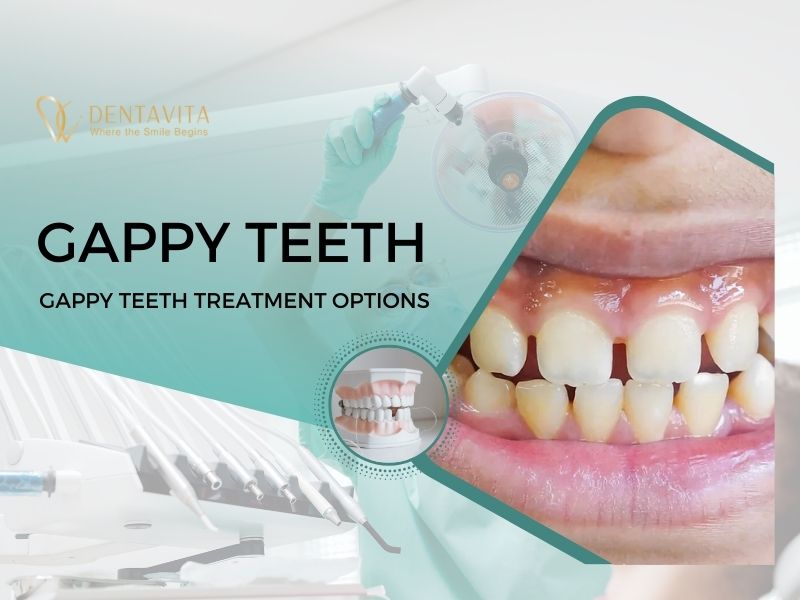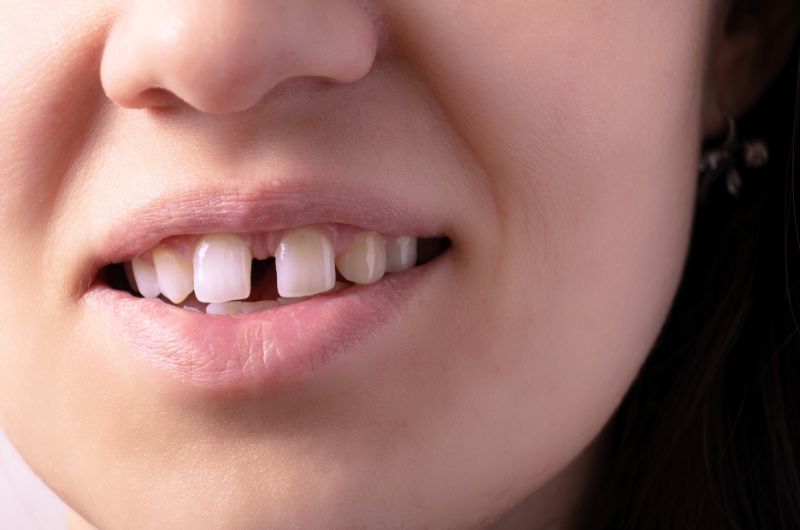Gappy Teeth: Causes, Treatment & Prevention

Gappy teeth, or diastema, are small gaps between your teeth, often seen in the front two. Imagine a tiny door in your smile! Some people find it charming, others prefer it closed. These gaps are usually harmless, but sometimes they affect chewing or speech.
Can it go away? For kids, yes! Adult teeth might naturally close the gap. For adults, treatments like braces, bonding, or aligners are the answer.
Curious to learn more about what causes gappy teeth and the best ways to treat them? All the details you need are just ahead in the article!
What causes gappy teeth?
Main cause:
- Natural tooth growth
- Habitual thumb-sucking
- Frequent tongue thrust
- Advanced gum disease
- Absent or missing teeth
- Presence of extra teeth
- Genetic jaw traits
- Thick oral frenum
Gappy teeth happen for a lot of reasons, and most of the time, they're easy to understand.
For kids, it's often part of normal growth. Baby teeth have gaps to leave space for bigger adult teeth. Even when adult teeth come in, gaps can stick around at first, but as more teeth grow, like the canines, they usually close on their own.
Habits can also play a role. Thumb-sucking or pressing your tongue against your teeth while swallowing can push them apart over time. Think of it like water slowly wearing down a stone! It happens gradually but leaves a mark. Gum disease is another culprit, weakening the support around teeth and causing gaps to form later in life.
Sometimes, gaps appear because of missing teeth. If a tooth doesn't grow or stays stuck in the jaw, it leaves an empty spot. On the other hand, extra teeth can block others from coming in, which also causes gaps.
Sometimes, it's all in your genes. Size makes a difference too. If teeth are small or the jaw is large, they just don't fit perfectly together! Like trying to fill a big box with tiny toys. This mismatch often leads to spaces.
Ever heard of the frenum? It's that small piece of tissue connecting your upper lip to your gums. It can create gaps if it's too thick or tight. It pulls on the teeth, especially the front ones, and keeps them apart.
Whether you treat them or embrace them is entirely up to you and your smile's story.
Is having gappy teeth harmful to your oral health?
No, gappy teeth are often harmless. For many, they're just a unique part of their smile. But larger gaps can sometimes cause issues, depending on their size and location.
Big gaps make it easier for food to get stuck. Imagine crumbs wedged into a tiny crack! If left there, they can cause plaque buildup, leading to cavities or gum irritation. Over time, this might even result in gum disease. Gaps can also hint at other problems, like missing teeth or misalignment.
Small gaps that don't trap food or irritate gums? They're usually no problem. But how do you know if a gap is harmless or not? Regular dental check-ups are key. Your dentist will spot any risks and guide you on whether to treat or leave them as they are.
Briefly? Sometimes, gaps are just a part of you! Other times, they need a little attention.
Gappy teeth in children

Gappy teeth in children are usually a normal part of growing up. Baby teeth are spaced to make room for larger adult teeth, and these gaps often close naturally as more teeth grow in, especially the canines.
Sometimes, though, gaps can signal issues like missing teeth, extra teeth, or thumb-sucking habits pushing teeth apart. If the gaps affect chewing, speech, or don't close over time, a dentist can help identify any problems. Most of the time, there's no need to worry! It's just part of their dental development.
Does having gappy teeth affect your speech or chewing?
Yes, gappy teeth can sometimes affect speech or chewing, but it really depends on where the gaps are and how big they are. Large gaps, especially between the front teeth, make sounds like “s” or “th” trickier to pronounce because air escapes through the space. It's like trying to whistle with a gap in your fingers! It changes the way things flow.
Chewing can also feel a bit off if the gaps throw your bite out of alignment. This makes breaking down food less efficient or even cause mild jaw discomfort. But here's the good news: most of these issues are minor and temporary, especially in kids. Gaps often close naturally as their adult teeth grow in.
For adults or when gaps cause real problems, solutions like braces, aligners, or bonding usually fix things. Regular dental check-ups are your best bet to catch and address any concerns early.
Preventing gappy teeth: Dental care tips for a perfect smile
Preventing gappy teeth is easier than you think. Start with the basics! Regular brushing, flossing, and check-ups. Think of your dentist as a mechanic for your teeth. Would you ignore a small engine noise? Probably not! The same goes for spotting early dental issues.
What about kids? Keep an eye on habits like thumb-sucking or pushing the tongue against teeth. These can nudge teeth apart, like shifting books on a shelf. Regular dental visits help monitor their growth and catch problems early.
And gums? They're the foundation of your teeth. Healthy gums keep teeth stable, so don't skip flossing.
If you notice early signs of misalignment or gaps forming, consult a dentist promptly. Early intervention, like using spacers or braces, can correct issues before they become bigger problems. Prevention always costs less time and stress than repair.
Can gappy teeth fix themselves over time?
Yes, gappy teeth fix themselves sometimes, especially in kids. As baby teeth fall out and adult teeth grow in, the new teeth often fill the spaces. Canines and molars usually help close those gaps naturally.
But what if the gap is caused by something else, like missing or extra teeth? In those cases, it's unlikely to fix itself. For adults, gaps almost never close on their own since the jaw and teeth are already fully developed.
So, when should you worry? Regular dental check-ups are key. A dentist will tell if the gap is part of normal growth or if it needs treatment, like braces or bonding. Sometimes, time is enough! Other times, you need a little help to set things right.
How to fix gappy teeth: Gappy teeth treatment options
Fixing gappy teeth can feel like a big decision, but the good news is there are plenty of options to choose from. Whether your gaps are small or caused by missing teeth, there's a treatment that fits your needs. Here is the most effective ways to close those spaces and achieve the smile you want.
Braces
Braces are a reliable way to close gaps, especially when misalignment is involved. They function by slowly shifting teeth to become closer to each other over time thus providing long term solutions. It normally takes between three months to two years to complete depending on the extent of the problem.
Aligners
Clear aligners, like invisalign, are a popular alternative to braces. They're removable, nearly invisible, and perfect for mild to moderate gaps. It is like braces that gradually move the teeth into the right position without the use of wire or brackets.
Dental bonding
Bonding is a quick, non-invasive fix for small gaps. A dentist uses a natural-looking material known as a composite resin to close the gap immediately. It is cheap and used to close small aesthetic spaces.
Veneers
Dental veneers are thin layers that are placed in front of the teeth. They enhance the aesthetic value of your teeth since they help to close the gaps and other aesthetic problems. Veneers such as porcelain veneers or laminate need a little amount of the tooth's surface to be trimmed to accommodate the veneer.
Dental implants
For spaces resulting from absent teeth, dental implants are the most ideal permanent fix. They fill the gap with an artificial tooth that is fixed to the jawbone thus preventing the rest of the teeth from shifting into the space.
Retainers
They are useful for fixing small spaces or for keeping the results of orthodontic work intact. They are made to order and comfortable to wear. Ideal for small areas.
Surgery (Frenectomy)
If a thick or tight frenum is causing a gap, a frenectomy may be recommended. This is a minor surgical operation that involves reshaping of the gum, and is usually accompanied by braces or aligners to totally eliminate the gap. A study published in the Journal of Clinical and Diagnostic Research highlights Closing a gap between the front teeth (maxillary median diastema) works best when a frenectomy is combined with orthodontic treatment.
Gum treatment
When gum disease causes gaps by weakening the tissue around the teeth, treating the gums is the first priority. Once the gum health is regained, other dental procedures can be carried out to fill the gaps
Is it painful to fix gappy teeth? What to expect during treatment
Fixing gappy teeth is usually not painful, but you might feel mild discomfort depending on the treatment. With braces or aligners, the first few days after adjustments can bring some soreness. Similar to the stiffness after trying a new exercise! It's temporary and fades quickly.
For bonding or veneers, the process is simple and typically painless. You might experience brief sensitivity, but it's nothing major. For more involved treatments like implants, local anesthesia keeps the procedure itself pain-free, with only mild soreness during recovery.
Orthodontist vs dentist: Who should you see for gappy teeth?
Who should you see for gappy teeth? A dentist or an orthodontist? It depends on the situation, but here's a simple guide.
Start with the dentist. They're like the GPS for your dental journey, pointing you in the right direction! For kids, they check if gaps are part of normal growth or caused by missing or extra teeth. For adults, they rule out gum disease or tooth loss first.
What if it's about straightening or closing gaps? That's when the orthodontist steps in. They're the architects of your smile, specializing in braces, aligners, and fixing alignment issues.
The dentist gets you started; the orthodontist handles the details. Regular check-ups with your dentist keep everything on track and let you know if an orthodontist is needed.
The truth about gaps in teeth: Myths vs facts
Gaps in teeth often raise questions. Are they harmless, or do they need fixing? We give info about it above. Here is brief explanation.
Do all gaps need treatment? Not at all. Many are purely cosmetic and don't affect oral health. If chewing and gum health are fine, gaps just are part of your smile's charm.
Will gaps close on their own? Sometimes. In children, gaps often close as adult teeth grow in. For adults, though, gaps caused by missing teeth or alignment issues usually need treatment.
Do gaps cause dental problems? Gaps themselves don't harm teeth. But larger ones can trap food, leading to plaque and gum irritation. Think of crumbs stuck in a couch. They're fine until they pile up. Regular dental care prevents these issues.
The truth is, gaps don't always need fixing. But if they cause discomfort or bother you, options like braces, aligners, or bonding can help. It's your smile, your choice!
 English
English
